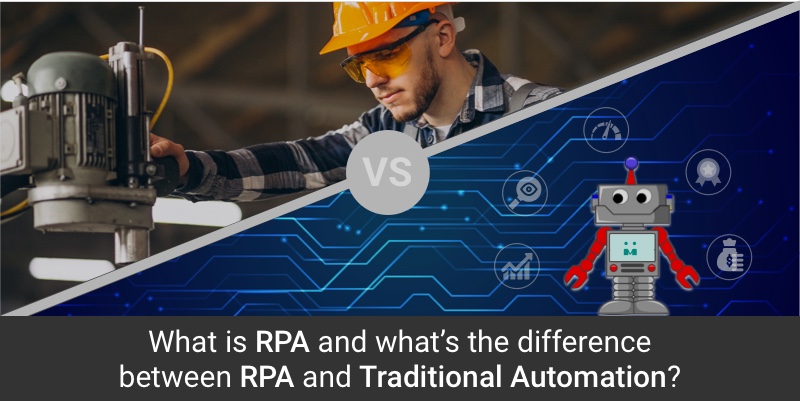ALL >> Business >> View Article
What Is Rpa And What’s The Difference Between Rpa And Traditional Automation?

Process automation has been used in industries for improving operational efficiency for decades. How is Robotic Process Automation (RPA) different from traditional processes?
Automation refers to the usage of software, machines or similar advanced technologies to carry out tasks or processes that would be usually carried out by humans. Automation could be mechanical, software or even virtual. RPA incorporates various disciplines to designs, programs, physical tasks, etc. using robots, chatbots, etc.
RPA is quite a system agnostic method, involving advancements in software, hardware or business processes, which is one of its major differentiators from traditional automation.
Robotic Process Automation vs. Traditional Automation
RPA is slightly different and more efficient as compared to traditional automation in many ways. Though, we can’t deny the fact that traditional techniques are the best suited in some processes and industries. ...
... Let us see their comparison based on various parameters like technology, software limitation, time to market, complex systems, customization, etc.
Technology
Traditional techniques rely on programming, APIs and other methods for integration of different systems on a single platform. On the other hand, RPA imitates various users’ actions at the UI level. Once the robots learn the actions or processes, they can automatically execute the user’s activity.
In traditional automation, the developers need to have a thorough knowledge of the target system and be proficient with programming skills. However, RPA developers don’t need to have an in-depth understanding of the complexity of the underlying technology as the robots simply comprehend user actions. It doesn’t require coding skills. The operations can be easily performed in a short time by giving training on the tools.
Traditional techniques require skilled developers and critical IT support while RPA can do with non-technical users and techno-functional SMEs who can simply teach the bots.
Limitations of Vendor/Software
There are many reasons why traditional techniques may not be the right option:
App customization is restricted because users don’t have the source code of the software.
Due to limitations of API, integrating different systems becomes challenging.
However, an RPA software solution works primarily on the user-interface layer and the above said restrictions won’t be applicable here, making it the best option.
Complex Systems
RPA is not dependent on the architecture of the systems that need to be automated. So, automating complex systems isn’t an issue in RPA, unlike traditional ways that involve working on legacy systems, making automation a tedious task for developers.
Time to market
Traditional ways need complex programming and quality testing whereas Robotic Process Automation provides ‘record & play’ method of automation. So, RPA has a faster turnaround time comparatively.
Customization
It is challenging to customize processes in traditional automation, while RPA can be easily customized to the specific needs of the customers. It is one of the key benefits of RPA. Applications like CRM, ERP, e-mail, calendars, etc. can be integrated and automation can be personalized.
Looking at all the above parameters, Robotic Process Automation outwits the traditional ways of automating business processes. However, traditional automation is great when it comes to moving a large quantity of information between systems. It still has many applications in different industries that outsmart an RPA system.
The bottom line:
If RPA is compared with the traditional techniques of automation, RPA is comparatively faster and can be implemented easily within a few weeks. Traditional methods may however take several months. RPA is a full-fledged automation solution and an apt choice for most applications. It is relatively a low complexity, low cost, and highly agile tool.
Most businesses are implementing RPA software solutions at a fast pace. What do you think? Does your company need robotic solutions for process improvement? If yes, Biz4Solutions is a leading choice of start-ups, small-scale and mid-sized companies across the globe. We have provided RPA solutions to streamline processes for industries like healthcare, human resources, transportation and logistics, finance, education, etc.
Get in touch to know more!
Add Comment
Business Articles
1. Lucintel Forecasts The Glass Fiber In The Global Marine Market To Grow With A Cagr Of 3.7% From 2024 To 2030Author: Lucintel LLC
2. Lucintel Forecasts The Glass Fiber In The Global E&e Market To Grow With A Cagr Of 3.9% From 2024 To 2030
Author: Lucintel LLC
3. Lucintel Forecasts The Global Frp Pole In Telecommunication Market To Grow With A Cagr Of 6.5% From 2024 To 2030
Author: Lucintel LLC
4. Lucintel Forecasts The Global Frp Pole In Power Transmission & Distribution Market To Grow With A Cagr Of 6% From 2024 To 2030
Author: Lucintel LLC
5. Lucintel Forecasts The Global Frp Pipe In Oil And Gas Market To Grow With A Cagr Of 5.1% From 2024 To 2030
Author: Lucintel LLC
6. Lucintel Forecasts The Global Frp Pipe In Chemical Market To Grow With A Cagr Of 3.6% From 2024 To 2030
Author: Lucintel LLC
7. Adopt A Modern Telecom Commission Management System To Fix Revenue Leakages
Author: Kevin
8. Quality Steel Pipes And Tubes With Commitment And Trusted Service
Author: CONTENT EDITOR FOR SAMPHIRE IT SOLUTIONS PVT LTD
9. Lucintel Forecasts The Global Foam Core For The Construction Market To Grow With A Cagr Of 3.7% From 2024 To 2030
Author: Lucintel LLC
10. How Important Is Mutual Fund?
Author: Sagar Shah
11. What Do You Need To Know About Customize Your Own Clothes
Author: Guangzhou Beianji Clothing
12. Detailed Tips To Choose Quality Cabinets And Joinery Melbourne
Author: William Harvey
13. Lucintel Forecasts The Global Foam Core For The Transportation Market To Grow With A Cagr Of 5.4% From 2024 To 2030
Author: Lucintel LLC
14. Silicone Sealing Foam Cord: The Valuable Option For You
Author: Dongguan Senma New Materials Technology Co., Ltd
15. How Investment Banking Companies And Credit Solutions Elevate Wealth Management
Author: Drishti Desai








